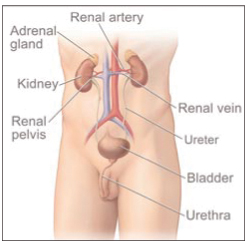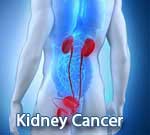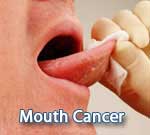Renal Cell Kidney Cancer
Introduction:
The kidneys are a pair of organs on either side of the spine in the lower abdomen. Each kidney is about the size of a fist. Attached to the top of each kidney is an adrenal gland. A mass of fatty tissue and an outer layer of fibrous tissue (Gerota's fascia) enclose the kidneys and adrenal glands.

This picture shows the kidney and adrenal gland.
The kidneys are part of the urinary tract. They make urine by removing wastes and extra water from the blood. Urine collects in a hollow space (renal pelvis) in the middle of each kidney. It passes from the renal pelvis into the bladder through a tube called a ureter. Urine leaves the body through another tube (the urethra).
The kidneys also make substances that help control blood pressure and the production of red blood cells.

This picture shows the male urinary tract.
Understanding Cancer
Cancer begins in cells, the building blocks that make up tissues. Tissues make up the organs of the body.
Normally, cells grow and divide to form new cells as the body needs them. When cells grow old, they die, and new cells take their place.
Sometimes this orderly process goes wrong. New cells form when the body does not need them, and old cells do not die when they should. These extra cells can form a mass of tissue called a growth or tumor.
Tumors can be benign or malignant:
- Benign tumors are not cancer:
- Benign tumors are rarely life threatening.
- Usually, benign tumors can be removed, and they seldom grow back.
- Cells from benign tumors do not invade tissues around them or spread to other parts of the body.
- Malignant tumors are cancer:
- Malignant tumors are generally more serious than benign tumors. They may be life threatening.
- Malignant tumors often can be removed, but they can grow back.
- Cells from malignant tumors can invade and damage nearby tissues and organs. Also, cancer cells can break away from a malignant tumor and enter the bloodstream or lymphatic system. That is how cancer cells spread from the original cancer (primary tumor) to form new tumors in other organs. The spread of cancer is called metastasis.
Several types of cancer can start in the kidney. This booklet is about renal cell cancer, the most common type of kidney cancer in adults. This type is sometimes called renal adenocarcinoma or hypernephroma. Another type of cancer, transitional cell carcinoma, affects the renal pelvis. It is similar to bladder cancer and is often treated like bladder cancer. Wilms' tumor is the most common type of childhood kidney cancer. It is different from adult kidney cancer and requires different treatment. Information about transitional cell carcinoma and Wilms' tumor is available from the Cancer
When kidney cancer spreads outside the kidney, cancer cells are often found in nearby lymph nodes. Kidney cancer also may spread to the lungs, bones, or liver. And it may spread from one kidney to the other.
When cancer spreads (metastasizes) from its original place to another part of the body, the new tumor has the same kind of abnormal cells and the same name as the primary tumor. For example, if kidney cancer spreads to the lungs, the cancer cells in the lungs are actually kidney cancer cells. The disease is metastatic kidney cancer, not lung cancer. It is treated as kidney cancer, not lung cancer. Doctors sometimes call the new tumor metastatic or "distant" disease
Kidney Cancer: Who's at Risk?
Kidney cancer develops most often in people over 40, but no one knows the exact causes of this disease. Doctors can seldom explain why one person develops kidney cancer and another does not. However, it is clear that kidney cancer is not contagious. No one can "catch" the disease from another person.
Research has shown that people with certain risk factors are more likely than others to develop kidney cancer. A risk factor is anything that increases a person's chance of developing a disease.
Studies have found the following risk factors for kidney cancer:
- Smoking: Cigarette smoking is a major risk factor. Cigarette smokers are twice as likely as nonsmokers to develop kidney cancer. Cigar smoking also may increase the risk of this disease.
- Obesity: People who are obese have an increased risk of kidney cancer.
- High blood pressure: High blood pressure increases the risk of kidney cancer.
- Long-term dialysis: Dialysis is a treatment for people whose kidneys do not work well. It removes wastes from the blood. Being on dialysis for many years is a risk factor for kidney cancer.
- Von Hippel-Lindau (VHL) syndrome: VHL is a rare disease that runs in some families. It is caused by changes in the VHL gene. An abnormal VHL gene increases the risk of kidney cancer. It also can cause cysts or tumors in the eyes, brain, and other parts of the body. Family members of those with this syndrome can have a test to check for the abnormal VHL gene. For people with the abnormal VHL gene, doctors may suggest ways to improve the detection of kidney cancer and other diseases before symptoms develop.
- Occupation: Some people have a higher risk of getting kidney cancer because they come in contact with certain chemicals or substances in their workplace. Coke oven workers in the iron and steel industry are at risk. Workers exposed to asbestos or cadmium also may be at risk.
- Gender: Males are more likely than females to be diagnosed with kidney cancer. Each year in the United States, about 20,000 men and 12,000 women learn they have kidney cancer.
Most people who have these risk factors do not get kidney cancer. On the other hand, most people who do get the disease have no known risk factors. People who think they may be at risk should discuss this concern with their doctor. The doctor may be able to suggest ways to reduce the risk and can plan an appropriate schedule for checkups
Symptoms
Common symptoms of kidney cancer include:
- Blood in the urine (making the urine slightly rusty to deep red)
- Pain in the side that does not go away
- A lump or mass in the side or the abdomen
- Weight loss
- Fever
- Feeling very tired or having a general feeling of poor health
Most often, these symptoms do not mean cancer. An infection, a cyst, or another problem also can cause the same symptoms. A person with any of these symptoms should see a doctor so that any problem can be diagnosed and treated as early as possible





































